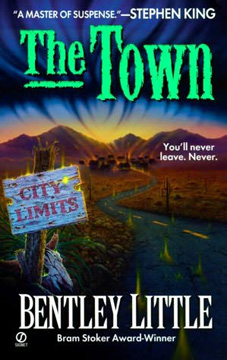 I have always been drawn to stories that are bound to keep me awake at night. While most of my friends were dredging off to tee-ball practice or increasing their merit badge numbers with the practical adventures of advanced cedar whittling, I was digesting tales like The Hook and Taily-po as fast as I could find them. This may have resulted in many sleepless nights, but at least I was always fun around the campfire. My interest in tales grew into a love of horror fiction. After being fed many of the genre’s basics (“The Monkey’s Paw” and "Dracula" particularly spring to mind) and devouring the works of King, Poe, and Lovecraft, I struggled to find suitable entries in the genre to satisfy my cravings. Coming from a stringently religious town with a population in the teens didn’t help much either. Eventually, I stumbled upon the works of Bentley Little.
I have always been drawn to stories that are bound to keep me awake at night. While most of my friends were dredging off to tee-ball practice or increasing their merit badge numbers with the practical adventures of advanced cedar whittling, I was digesting tales like The Hook and Taily-po as fast as I could find them. This may have resulted in many sleepless nights, but at least I was always fun around the campfire. My interest in tales grew into a love of horror fiction. After being fed many of the genre’s basics (“The Monkey’s Paw” and "Dracula" particularly spring to mind) and devouring the works of King, Poe, and Lovecraft, I struggled to find suitable entries in the genre to satisfy my cravings. Coming from a stringently religious town with a population in the teens didn’t help much either. Eventually, I stumbled upon the works of Bentley Little.
Reading a Bentley Little novel is like being dropped off in the middle of a rainforest at midnight. Naked. There are all of these frightening things in the darkness, and you know something bad is going to happen…you just have no idea what direction it’s coming from. His novels are marked with a sudden descent from normalcy into an almost surreal landscape where many of the characters are blind to their surroundings. The Town is a perfect example. In one scene you’ll see someone invited his friend over to crash on the couch following a marital spat, a typical scene that everyone has seen in many movies, books, and plays throughout the years. Little derails the scene by having the friend introduce his “wife,” a full grown heifer. And then they share a vividly described kiss.
We begin The Town with Gregory Tomasov, a recent California Lottery winner, moving his family and his mother from their urban Southern California home, to
What makes the HORRIBLE THINGS (which I’m sure Stephen King trademarked somewhere along the way) so creepy, is the way they’re rationalized. Little lets us know that something evil is definitely going on, but everything that happens is rationalized through the character’s point-of-view. It’s damn eerie to read a kid rationalizing why he should masturbate into his sister’s panties. And it is this uncomfortable feeling that pervades most of the book. The parts that don’t scare, make you feel dirty and downright voyeuristic.
The Town, and much of Little’s other novels and stories, is separated from the works of most other horror writers by the way the truly frightening elements seem to come out of left field. In another scene a woman gives birth, in very bloody detail, to a cactus with a baby’s face. The scene has no real reason to it, and it’s never really explained. It just sort of happens, and we’re left to wonder what implications this has for the characters. At times this can be frustrating and seem out of place, distracting from the story. But, when it works, it increases the what the hell? quotient to insane levels and casts a freaky shadow over the rest of the story.
Long before the end we come to realize that the story is one we’ve heard before. It centers around evil spirits, or “uninvited guests” that cause harm in nasty ways for childish reasons. Of course, this insight comes through a Native American (and Native American culture figures prominently in many of Little’s works), and though Little never really says it, you get the sense that the spirits aren’t the only “uninvited guests” to live on the land. The theme of invasion and broken privacy occur in many places throughout.
This is not great literature by any means, and I ‘m fairly certain Little is happy that way. Yet, what it sets out to do, disquiet the reader, it does fairly well. If you’re looking for something to make the hairs on the back of your neck stand up and march, you could do much worse than visit The Town.
7.5 out of 10